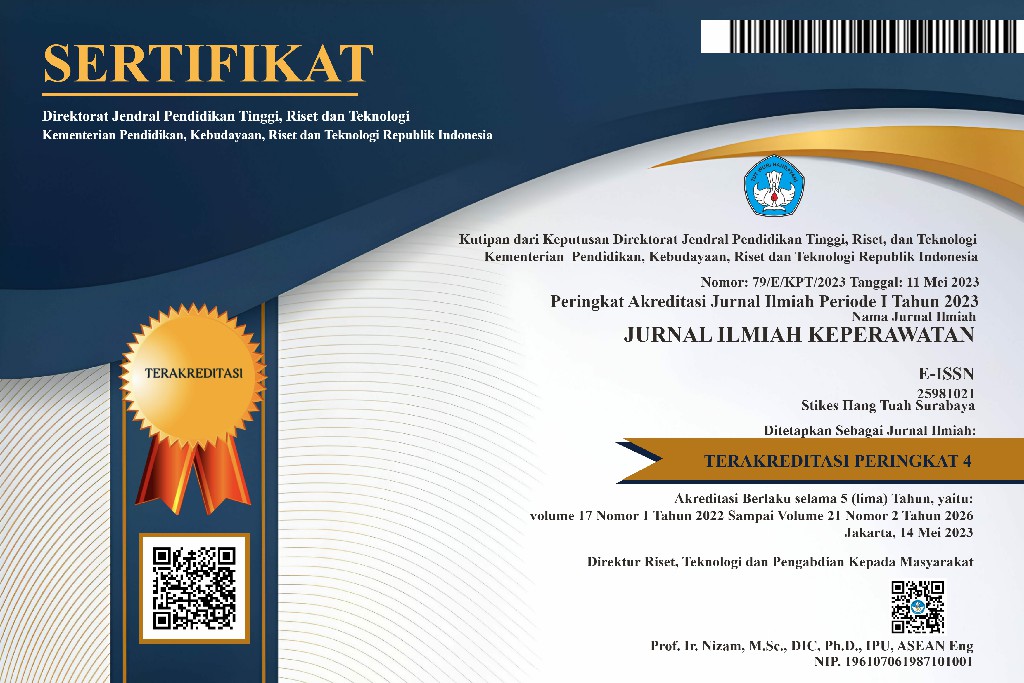Tugas Kesehatan Keluarga dan Tingkat Kemandirian Keluarga di Wilayah Pesisir Kota Surabaya
DOI:
https://doi.org/10.30643/jiksht.v14i1.47Abstract
Family is the smallest unit of society that has a large influence on the health of each member of his family. The family is the focus of the approach in implementing the “Program Indonesia Sehatâ€. Families have assignments in the health sector to improve and maintain family health. One aspect that becomes a benchmark is the level of family independence. This study used a cross-sectional design with a sample of 150 families. Data analysis using the Spearman rho correlation test. The results showed that there was a positive correlation between family health duties and the level of family independence (r = 0.630, p = 0.000). Based on the results of this study, it is expected to be input and information about family health tasks as a measure of success in increasing family independence when providing family nursing care.
Â
Keywords: Family, Health Assignments, Level of Independence
Downloads
References
Allender, J.A., Rector, C.,& Warner, K.D. (2014). Community & Public Health Nursing Promoting The Public’s Health(8th ed.). Philadelphia: Lippincott Williams & Wilkins
Alphert, P. T. (2013). Postural balance: understanding this complex mechanism. Home Health Care Management & Practice,25, 279–281. doi: 10.1177/1084822313496790
Anderson, E.T. & Mc.Farlane, J. (2011). Community as partner theory and practice in nursing (6th ed.). Philadelphia: Lippincott Williams & Wilkins
Badan Penelitian dan Pengembangan Kesehatan Kementerian Kesehatan RI. (2013). Riset kesehatan dasar: Riskesdas 2013. Jakarta: Kemenkes RI
Badan Pusat Statistik (BPS). (2013). Proyeksi Penduduk Indonesia Indonesia Population Projection 2010-2035. Jakarta: Badan Pusat Statistik. Diakses dari
http://www.bappenas.go.id/files/5413/9148/4109/Proyeksi_Penduduk_Indonesia_2010-2035.pdf
Dahlan, M.S. (2010). Besar sampel dan cara pengambilan sampel dalam penelitian kedokteran dan kesehata (edisi ke-3).Jakarta: Salemba Medika
Friedman, M.M., Bowden, V.R., & Jones, E.G. (2003). Family Nursing: Research, Theory and Practice. New Jersey: Pearson Education.
Hanson, S. M. H., Gedaly-Duff, V., & Kaakinen, J. R. (2005). Family Health Care Nursing: Theory, Practice, and Research. Philadelphia: Davis Company.
Kemenkes RI (2017). Program Indonesia Sehat dengan Pendekatan Keluarga. http://www.depkes.go.id/article/view/17070700004/program-indonesia-sehat-dengan-pendekatan-keluarga.html
Leung, P., Orrell, M., & Orgeta, V. (2014). Social support group interventions in people with dementiaand mild cognitive impairment: a systematic review of theliterature. Int J Geriatr Psychiatry. Advance online publication. doi: 10.1002/gps.4166
Malini, M. H. (2015). Original research impact of support group intervention on family system strengths of rural caregivers of stroke patients in India. Aust. J. Rural Health. 23, 95–100. doi: 10.1111/ajr.12126
Marquis, B. L., & Huston, C. J. (2012). Leadership Roles and Management Functions in Nursing: Theory and Application. Philadelphia: WoltersKluwer Health and Lippincott Williams & Wilkins.
Sulistyowati, N. (2012). Hubungan Pelaksanaan Tugas Kesehatan Keluarga Dengan Kekambuhan Skizofrenia Di Desa Paringan Kecamatan Jenangan Kabupaten Ponorogo. journal.unair.ac.id. Surabaya : Universitas Airlangga
Utami, N.M.S.N. (2013). Hubungan antara Dukungan Sosial Keluarga dengan Penerimaan Diri Individu yang Mengalami asma. Jurnal Psikologi Udayana, 2013, Vol. 1, No. 1, 12-21, ISSN 2354-5607. Bali: Universitas Udayana.
Van Gelderen, S., Krumwiede, N., & Christian, A. (2016). Teaching family nursing through simulation: family-care rubric development. Clinical Simulation in Nursing, 12(5), 159-170. http://dx.doi.org/10.1016/j.ecns.2016.01.002
Downloads
Published
Issue
Section
License
Authors retain copyright and grant the journal right of first publication with the work simultaneously licensed under a Creative Commons Attribution-ShareAlike 4.0 License that allows others to share the work with an acknowledgment of the work's authorship and initial publication in this journal.












